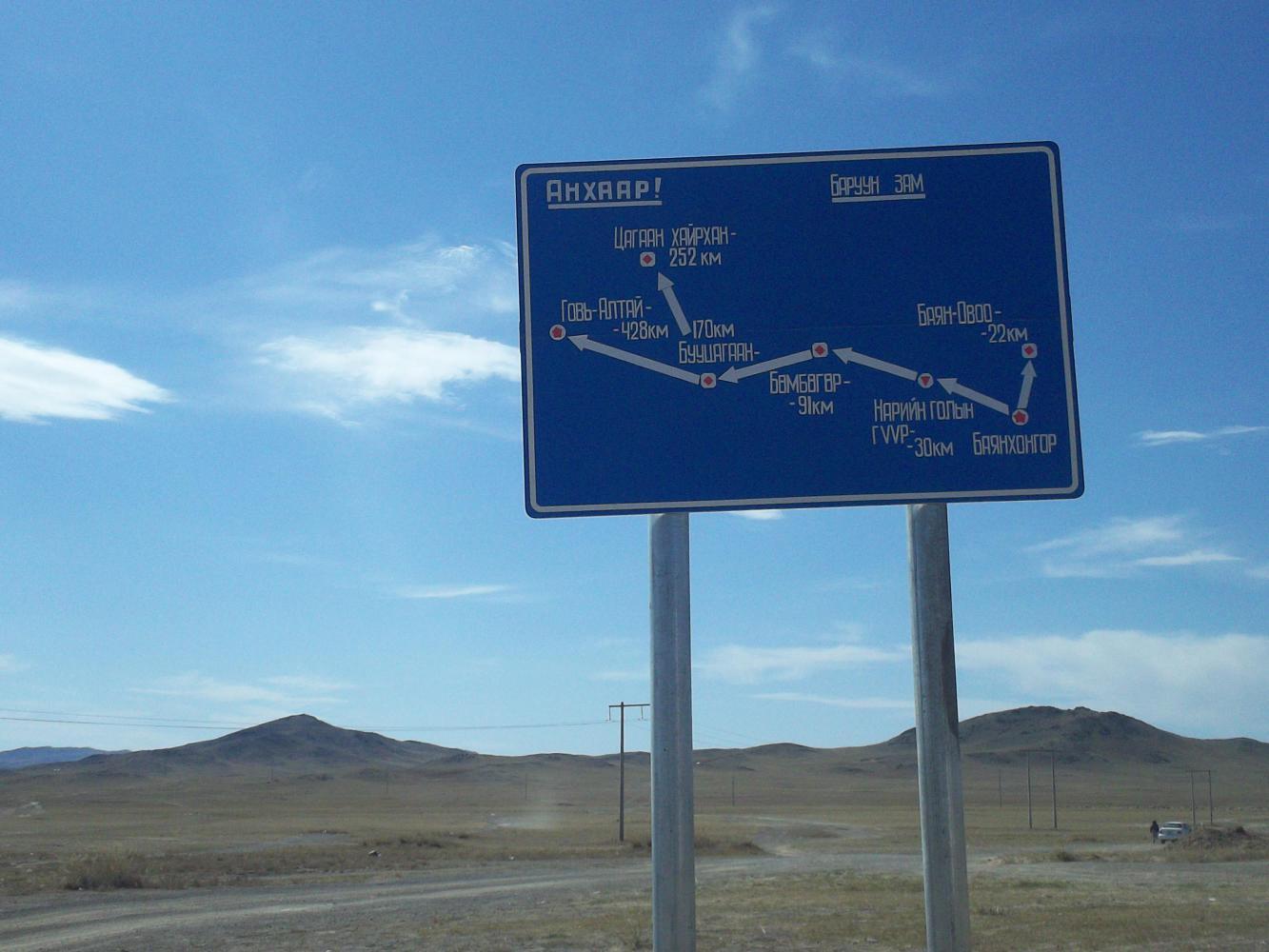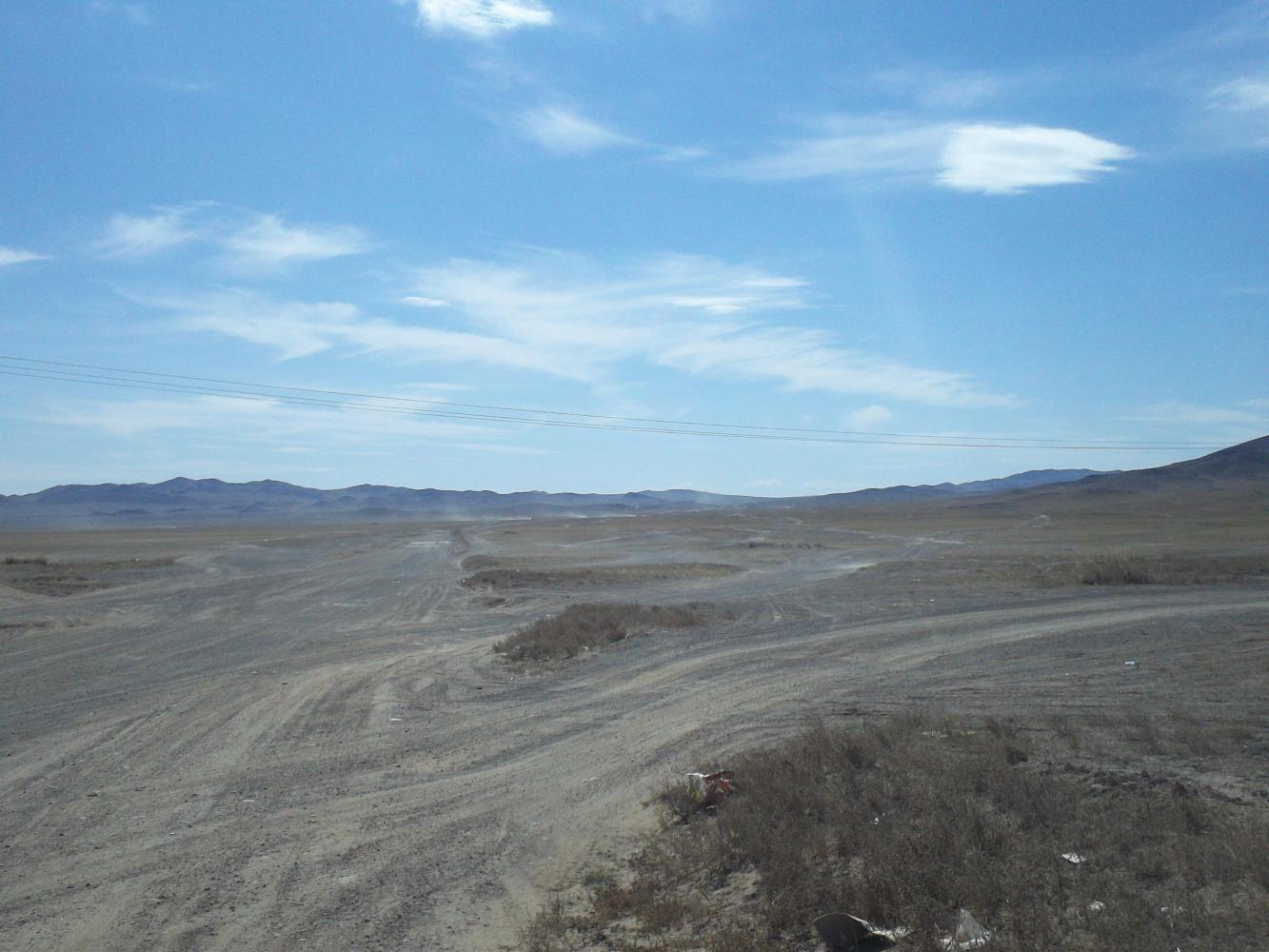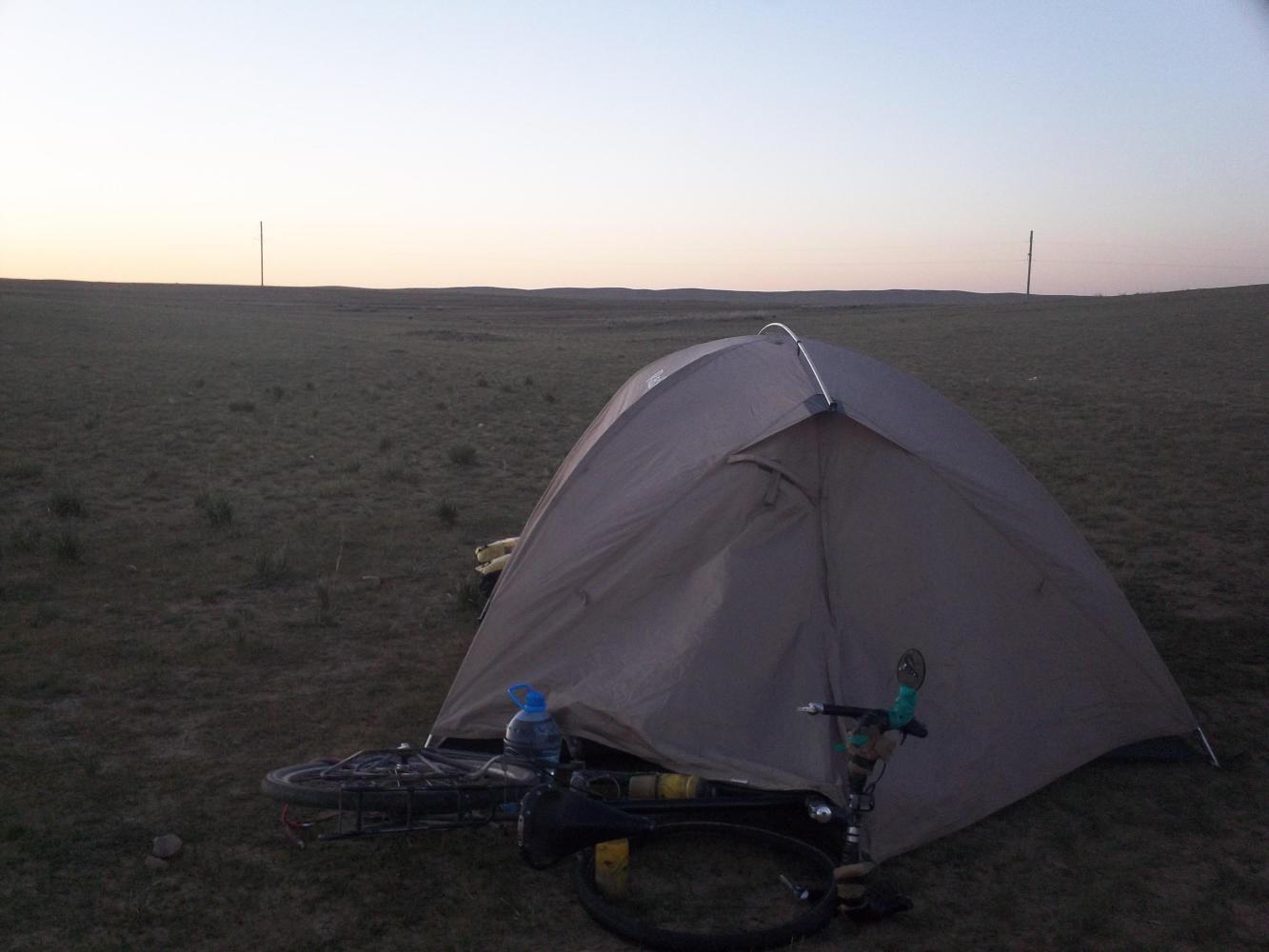September 10, 2014
The end of the road: Relax, I'm not thinking of quitting again, I just mean the road ended. Literally
Amazingly enough I came across another touring cyclist the next morning as I approached Bayankhongor, the big town which marked the end of the paved road. This one was a young man from Korea with the easy-to-remember name of Bak Hyung Yeol. He was cycling a big loop, from Korea across China and then back via Mongolia and Siberia, which meant he had come from exactly the direction that I was heading, taking the border at Bulgan, coming through the mountains, and across the bad roads I would now need to cycle myself. I was keen to find out everything I could!
He started by asking me if I had GPS and looking very concerned for me when I said that I didn't. There were three villages marked on my map between Bayankhongor and the next town of Altay, 400 kilometres away, but Bak Hyung Yeol told me that the road didn't go through any of them. On my map the road clearly did go through them. But Bak Hyung Yeol was insistent, and said that the road was in fact 50 kilometres away from them. But then he told me that there was no road, just desert. I started to think maybe Bak Hyung Yeol had been cycling in the wrong place.
With Elinzska's worrying story still in mind I asked Bak Hyung Yeol if he'd had any trouble on the way. I was thinking along the lines of the people, potentially being robbed and so on, but instead he told me that he'd seen wolves on the road. The dangers of Mongolia were growing. Then I noticed that Bak Hyung Yeol had a hammer strapped to the back of the bike. "Is that for the wolves?" I asked. "No," he said, "for the tent." Well I guess you can't always find a rock.
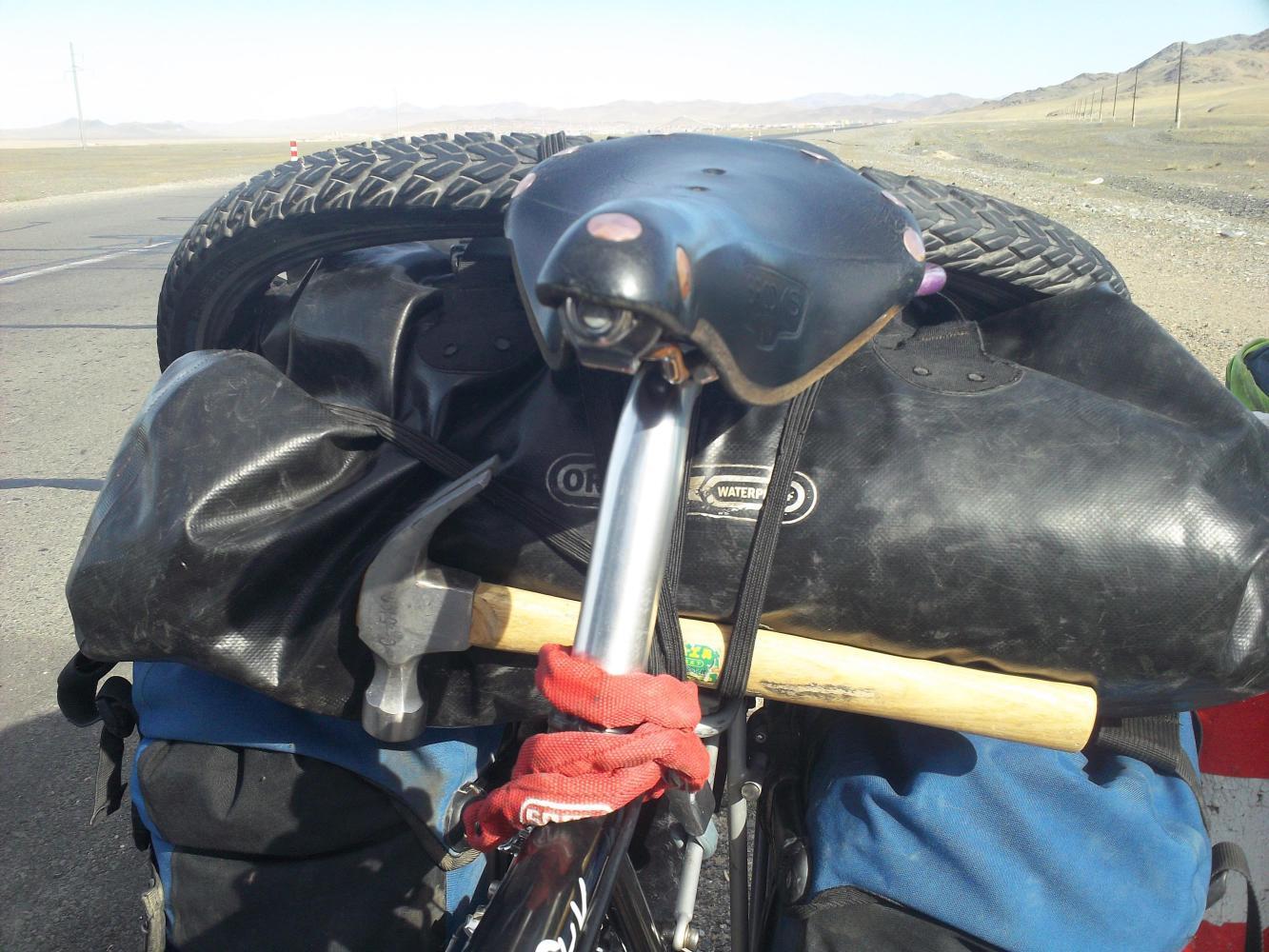
| Heart | 1 | Comment | 0 | Link |
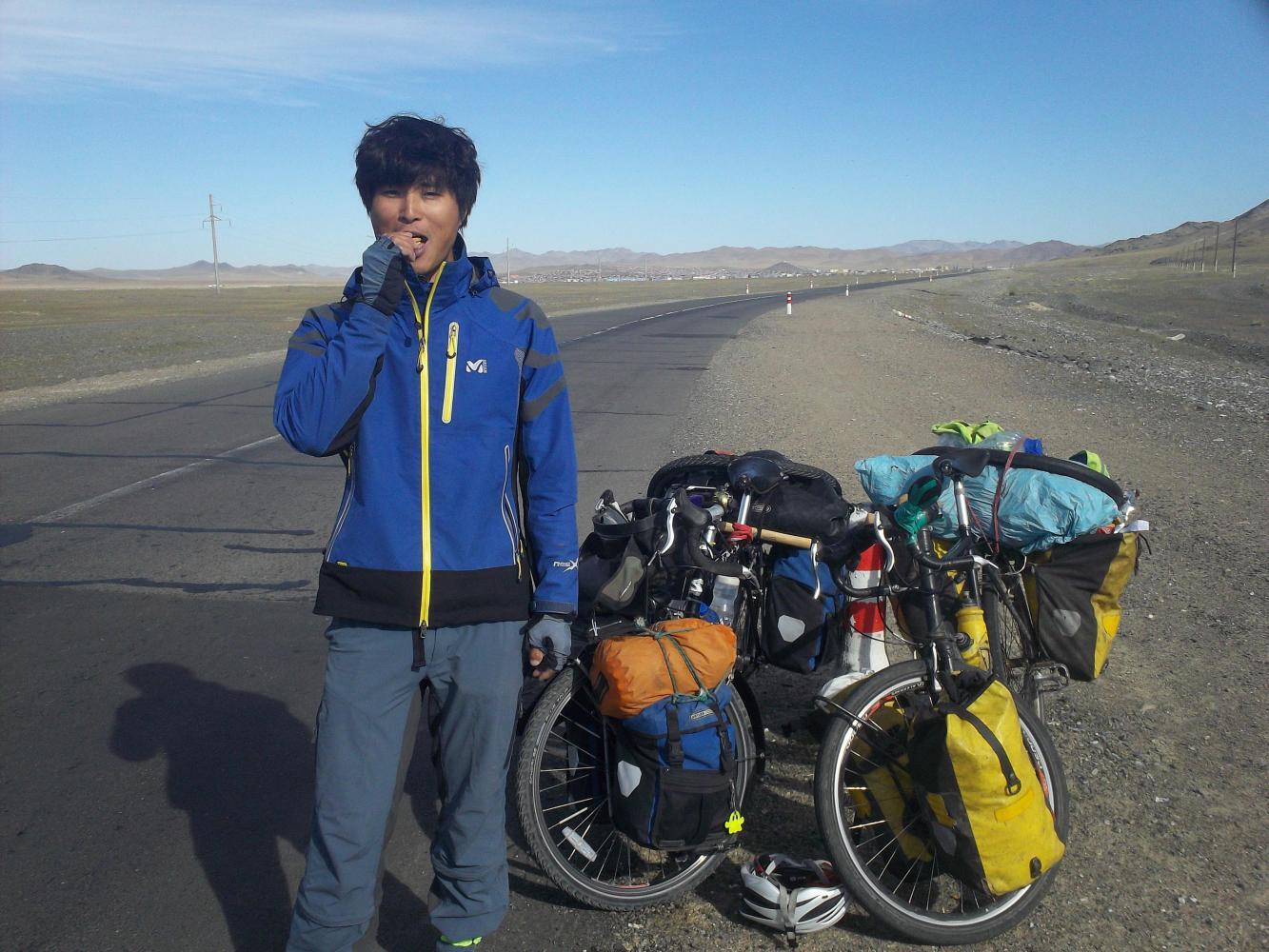
| Heart | 2 | Comment | 0 | Link |
Bayankhongor was quite a large town and I needed to try and find a welder because the braze-on for my front rack had snapped off. This happened before, and I'd got it welded back on in Istanbul, but with great credit to that Istanbul welder it wasn't his handiwork that had failed but the corresponding braze-on on the other side. It was a real struggle to find a man who could weld it back on in a city of 20 million, so I was a bit worried about finding one in a town of 20,000, but I need not have worried. I stopped at the first mechanic I found and by great fortune spoke to a man that could speak perfect English. His name was Mogi and he told me that a man just around the corner could do the weld for me.
I took advantage of my new English-speaking friend to ask about the road to Altay and, after looking very concerned when I said I had no GPS, he gave me one of the greatest pieces of advice anyone had ever given me. "Just follow the electric pylons" he said. Just follow the electric pylons! Yes! It was brilliant! Then he told me not to cycle at night, which I wasn't planning on doing anyway. "Serously, don't cycle at night," he repeated, "there are wolves." I promised not to cycle at night, and that I would be very wary of wolves.
I found the welder and he spoke no English but it was fairly obvious what I wanted him to do and I took the front fork out and had to act as his assistant, holding the braze-on in place while he welded it back on. He put down his big welder's mask and I, who was just as close to the action, held my hand over my face, as the sparks began to fly. Soon the job was done with my arm only slightly singed and I asked him how much he wanted. I was a bit worried that he might try and rip me off, being the foreigner and all, but he only asked for 1000 tugriks (about 40 cents.) I gave him 2000, I'm amazingly generous like that.
After using the wifi in a hotel reception I went to the supermarket to buy supplies. Bak Hyung Yeol had told me that there was nowhere to buy food or water and not even any yurts to ask things from. He had done the 400 kilometres from Altay in four days, but he would have had the wind behind him and I thought it would take me at least five or six days into the wind. It was impossible to get enough water onto the bike, but I bought enough food for five days, and fifteen litres of water, which was about as much as I could carry, and might last five days if it wasn't too hot. The bike was ridiculously heavy once I'd got all that on it and I wobbled and struggled to keep my balance on my way through the town.
I got to the edge of town. The end of the road. In front of me was a big range of hills. There were tracks going all over the place. A lot to the left and a lot to the right, and one or two in the middle. Remembering Mogi's wise words I looked for the electric pylons and saw a row of them leading up alongside the tracks to the left. Then I looked at the tracks to the right and saw another row of electric pylons. Ah! What to do?! Oh, this was going to be harder than I thought. I wasn't even out of town yet and I was lost! Luckily there was a map on a board to help:
I went back to a gas station and asked the attendant which was the way to Altay. He pointed to the tracks to the left. It looked from the few clouds of dust on the hillside like that was the way most of the traffic was going, so I was happy, and set off in that direction. It wasn't half difficult though. There were six or seven tracks, all going in the same general direction, but all in pretty bad shape. The hill went on forever, a good 20 kilometres of climbing, made worse by a stiff headwind and the ridiculous amount of weight on the bike. I consoled myself thinking 'at least I don't have a hammer.'
There wasn't much traffic going up the hill but quite a lot of what there was came to see me, often switching tracks just to hunt me down. In most cases I was offered a lift including once by a motorcyclist. It was a pretty incredible and yet completely serious suggestion. I responded: "I know you can carry a lot on those motorcycles, but you ain't getting me, my bicycle, and 15 litres of water on there and that's a fact."
An oil tanker was parked up on one of these tracks and I pulled up next to it, mostly because I needed to reorganise the load on the back of my bike which was slipping off, and there was nowhere else to lean it, so I leaned it against the oil tanker. The driver, a middle-aged pregnant man, came to see me. His t-shirt was pulled up almost to his nipples and he rubbed his huge bare belly dumbly. He asked in sign-language whether I wanted a lift. I declined. He asked me where I was going, and I told him Altay. He wrote '400km' in the dust on the side of his cab. I nodded and told him it was no problem. Then, looking concerned for me, he drew a surprisingly good picture of a wolf.
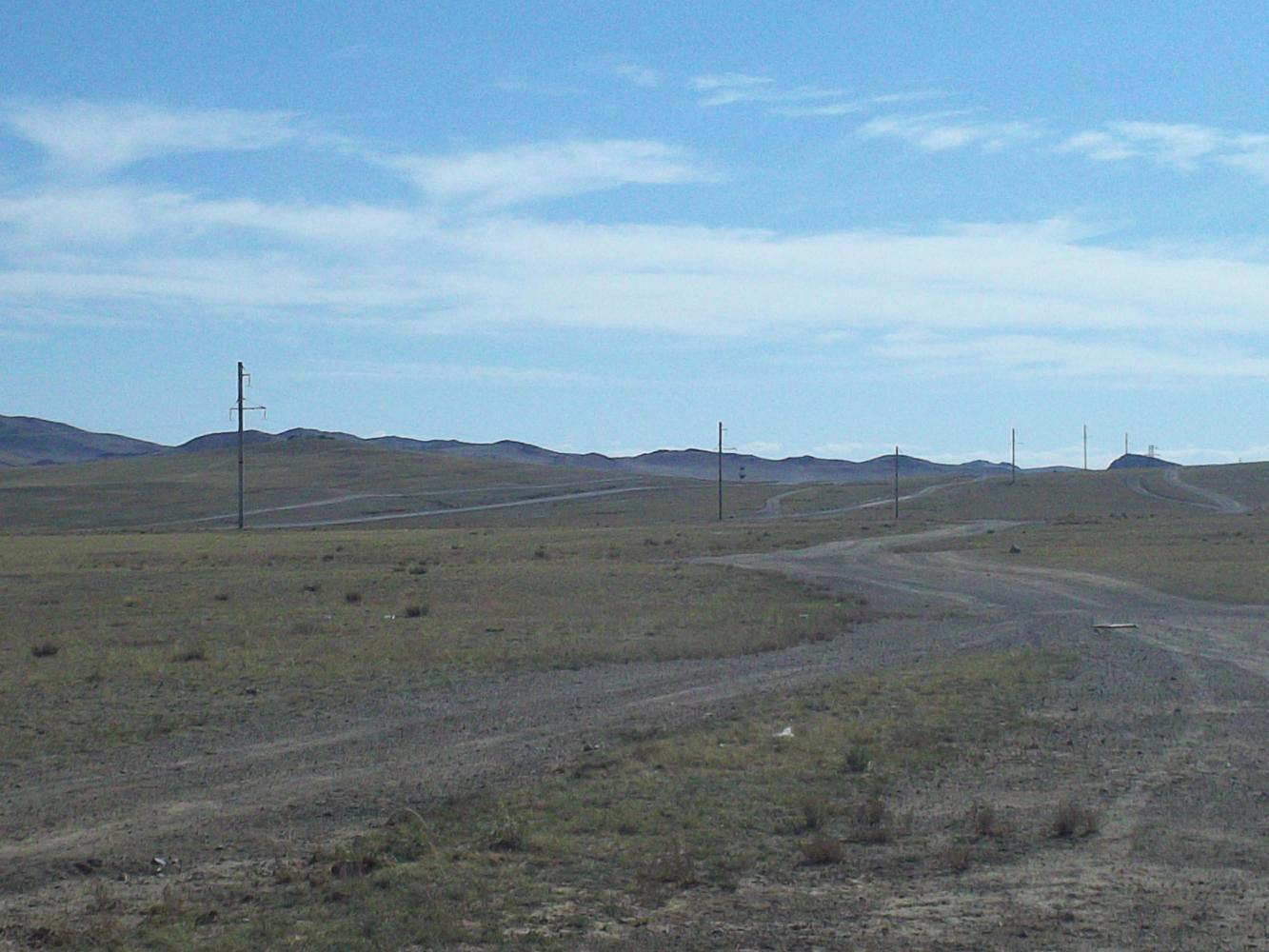
| Heart | 1 | Comment | 0 | Link |
As the climb leveled off the tracks got further apart, until the furthest were several kilometres away from one another. There were some to my left and some to my right, but I stuck to the ones closest to the electric pylons and was confident I was going the right way. It was actually rather fun now. I set up camp for the night and watched as the moon rose before me. It was beautiful and seemed ever so large. It was a full moon. A full moon! Now, what was it, there was something I was supposed to be wary of out here? Hmm, something I was supposed to look out for? I looked again at the full moon. Oh yes, wolves! I decided to take some precautions. My precautions were to put my chain lock together with my frying pan. If a wolf came I would bang them together and it would make an awful noise and scare the wolf away. And if that didn't work, I'd seen enough cartoons to know that a frying pan made a great weapon for hitting animals over the head with. Except my frying pan didn't have a handle so wouldn't be so good for hitting a wolf over the head with. No, instead I would use the handle-less frying pan as a shield and from behind this shield I would whip the wolf into submission with my chain. Yes, this plan was fool-proof, I was sure. I slept easy.
Today's ride: 62 km (39 miles)
Total: 28,113 km (17,458 miles)
| Rate this entry's writing | Heart | 3 |
| Comment on this entry | Comment | 0 |
